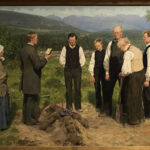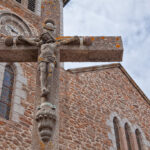“Why can the dead do such great things?” asks Augustine in 426. The venerable theologian observes that God, being eternal, performs wonders in our physical world through his own actions, and at times via angels, the souls of martyrs, the spirits of our dead, humans, or by any means he chooses. “Some things are done one way, others another, by means quite beyond mortal comprehension—nevertheless, each miracle testifies to that faith which proclaims resurrection to eternal life.”
If Augustine is right, perhaps our dead can do great things not only in the corporeal world, but the incorporeal one as well. I have this idea that when we die, even the worst of us, we will have advocates on the other side. Jesus, the Advocate, the Holy Spirit, to be sure. And more.
“I know she did awful things,” a mother cries. “Let me show you her heart when she helped her little brother learn to walk.” Another voice chimes in. “Of course she was broken, but she’s good, I love her so,” a father weeps. “Maybe it’s my fault, take me instead.” Soon a chorus is heard: grandparents, siblings, aunts, uncles, cousins, friends. The fabled pearly gates may be a noisy place.
The idea is hardly earth-shattering. Yet some believers disagree with this suggestion. Jesus is the only Advocate, the thinking goes. Anything else detracts from him. I’m not so sure.
“Since both the departed saints and we ourselves are in Christ,” notes Bible scholar and Anglican bishop N. T. Wright, “we share with them in the ‘communion of saints.’ I see no reason why we should not pray for and with the dead and every reason why we should . . . Love passes into prayer; we still love them; why not hold them, in that love, before God?” And if they still love us, they too may hold us, in that love, before the divine. Does God ignore our loved ones now that they are with him?
In her 2015 Presidential Address delivered to the Fellowship for Biblical Studies in Melbourne, Catherine Playoust (University of Divinity) takes a hard look at the cloud of witnesses mentioned in the Epistle to the Hebrews: “Therefore, since we are surrounded by such a great cloud of witnesses, let us throw off everything that hinders and the sin that so easily entangles. And let us run with perseverance the race marked out for us.”
This passage refers to luminaries of faith as described by the letter’s author: Abel, who speaks even though he is dead, Enoch, Noah, Abraham, Moses, and so on. To these Augustine adds martyrs for Christ. And perhaps they’re not alone.
Playoust considers many interpretations for the enigmatic reference to such witnesses, but the simplest interpretation still gives her comfort: “I have frequently been cheered by the idea that the challenges of life in Christ are not carried out in isolation, and moreover that one’s company includes not only fellow Christians living on earth still, but also ‘a cloud of witnesses,’ people who have already passed from this life.”
Suppose our loved ones are in this bustling cloud of witnesses, watching us not in judgment, but in perfect understanding, support, and compassion for our struggles. But if our loved ones are still with us, what are they witnesses of?
This section in Hebrews is often translated as run the race. But this may be an oversimplification, notes Colin Sims in Irish Biblical Studies. His close examination of the Greek text suggests that the passage is not speaking of a race, but a lifelong pilgrimage that demands steady, relentless striving and pressing onwards: “The whole context and conceptual framework of Hebrews 12:1 is the need for endurance in suffering and hardship.” Zoe Hollinger adds in The Bible Translator that a more apt English rendering may be “‘let us undergo the struggle’—the focus being on the audience’s struggle in the face of death.”
And what a struggle it is. Psychologists Richard Tedeschi and Lawrence Calhoun, both with the University of North Carolina, note that the sole redeeming aspect of losing a loved one lies in our ability to continue living: “Any growth experienced is viewed as arising from the struggle to cope, the struggle to simply survive. Growth from the struggle with suffering can manifest itself in several ways: changes in the self, in relationships with others, in life priorities, and in the domain of spirituality.”
Perhaps, along with God and his angels, our loved ones make up a personal cloud of witnesses walking beside us in the pilgrimage of life. Mourners often experience their dead through one of the five senses, a common phenomenon that hospice bereavement specialist Julie Anna Strassman (Eden Theological Seminary) calls “visitations from the great cloud of witnesses.” She suggests that pastoral care might wisely invest in studying current grief research in this area as it relates to continuing bonds, a term that speaks to “redefining, rather than relinquishing, a continued bond with the deceased,” according to Robert Neimeyer (Portland Institute for Loss and Transition).
This is why I prefer the term struggle as suggested by professional Bible translators. We are not sprinting before a cheering stadium, or stumbling in a marathon to earn a gold medal. Maybe our cloud of witnesses does not demand that we win, merely that we continue in hope and endurance, as they continue in love and empathy.
The Babylonian Talmud suggests that in the World-to-Come there will be no competition, jealousy, or hatred. Instead, we will dwell in the radiance of shekhina, the presence of God. Modern Christians also speak of this dwelling place, usually referring to the Holy Spirit in God’s house, observes theologian Michael Lodahl (Point Loma Nazarene University). This is certainly accurate, but the Talmudic writers are making a different point.
It is precisely these petty emotions, which can so often overwhelm us, that represent our worst selves, our brokenness and lostness. When the teacher of Ecclesiastes writes that each of us will face God’s judgment, he specifies those things that are hidden, the good and the bad. I suspect that deep in our secret hearts we will never be free of our weaknesses, never truly and completely healed, not in this life.
Being judged for our secret hearts may be an act of divine compassion and mercy, for surely God understands our hopes for goodness as well as our failures. “Every meal in which we remember Jesus and those who have died in him also prepares us for our own death,” writes Henri Nouwen. “Thereby we not only feed ourselves, but also nurture each other, and so we become, each day, a little more the community of care to which we always will belong.”
Our loved ones who watch over us in life may also be our advocates in death. Jesus knows our hearts, their love, and if God is to be believed, such pleas—theirs and ours—do not fall on deaf ears. “I will have mercy on whom I will have mercy,” God tells Moses, “and I will have compassion on whom I will have compassion.”
I take God at his word. Divine grace may be more complex than we can understand and much simpler than we dare believe. “God’s ultimate self-revelation to Moses,” says respected Hebrew authority James Kugel is that “‘I am by nature compassionate and merciful (despite all evidence to the contrary). . . . I can’t help it.’”
Mercy in the afterlife is not a new idea, but its form is solely the province of the divine, writes Johannes Lindblom (University of Lund) in his influential volume Prophecy in Ancient Israel. He cites the Gospel of John, the wind blows where it wishes, to demonstrate that God acts at his discretion: “Yahweh sent His spirit and His word; and this He did when it pleased Him.” Lindblom notes that revelations from God did not come when expected or demanded by ancient Israelites. There were exceptions, but even those indicate occasions when God chose to speak rather than being induced by supplicants.
This seems obvious—God is God, after all—but it can be difficult to resist presumption and hubris. God will punish the unjust, we may muse, but have mercy on me. And in his mercy, we hope God will provide what we want when we want it. So we fast, we organize prayer circles, we meditate, we do, do, do. “Such indications of intentional preparation are rare in classical prophecy,” Lindblom says. “We never hear of the great prophets engaging in such exercises. . . . Yahweh acts when the right moment has come.”
Meditation, fasting, congregational and solitary prayer are not wastes of time. Rather, it may be that in communing with God, we are enriched by the act itself, with no other wish than to be with the Lord. “Prayer comes to pass in a complete turning of the heart toward God, toward His goodness and power,” says theologian Abraham Heschel. “It is the momentary disregard of our personal concerns, the absence of self-centered thoughts, which constitute the art of prayer. Feeling becomes prayer in the moment in which we forget ourselves and become aware of God.”
At that moment, perhaps, our entreaties may be stilled, our timelines and schedules and to-do lists lose importance, and suddenly just feeling God’s concern is enough. Indeed, more than enough, as Job wrote with elegant simplicity: “I had heard about you with my ears, but now my eye sees you.”
Our pain can be excruciating in this physical world. We often struggle under the weight of past mistakes. Yet this burden may at times be lightened in surprising ways. “[God’s] intervention is also seen in sudden experiences, at times of utter despair,” Swiss physician Paul Tournier tells us, “when all at once the mind is filled with the absolute certainty of God’s love, like an unexpected signpost upon an uncertain road.” Tournier’s insight speaks to all of us who know the trials of life and the heartbreak of grief.
This may be why the New Testament Greek word for grief or sorrow, λύπη (lýpe), also means pain, according to Anthony Smart, lecturer in ancient and medieval history at York St. John University. In the Greek and Roman worlds, grief was expressed through lament, ritual, and cultural norms. Then as now, the pain of loss becomes part of everything we do. “If being human is complex,” says Smart, “then so too must our history be, our emotional past and emotional frameworks of our historical antecedents.”
These Greek influences inspired later biblical writers to put on papyrus their thoughts about the afterlife, according to Kugel. One instance is the strong woman mentioned in Proverbs, hailed for her deeds—ma‘aseh—a Hebrew word that also means person or offspring. In this light, the famous passage, let her works praise her in the city gates, refers not to worldly glories but otherworldly portals: “Surely this ideal wife is not being praised by inanimate objects, but by her sons ‘at the gates.’”
Which returns me to Augustine.
We may not be so different from ancient Romans, Greeks, Israelites, or early Christians when we think of grief as lýpe—pain. I have yet to meet a fellow mourner who fails to nod in agreement when I suggest that it is an act of courage to continue each day. Yet grief is also an act of love.
If by God’s grace the spirits of our dead interact with us, as Augustine asserts, then my daughter Jess, dead since 2015, continues in eternity. She lives. And something more.
The resurrection that Augustine mentions holds little joy for me without a promise of reunion with my little girl. I’m not sure I have much use for a god that has no room for Jess in his heaven. Heretic! one might exclaim. Ingrate! And one may be right. I’m probably guilty of both when it comes to my daughter’s place in eternity. I am as God made me: Jess’s Dad. I suspect he built parents this way for a reason.
Perhaps when we die, we will discover that God understands perfectly the pain we have endured in this life. He may (who dares presume?) deem sufficient the joys, sorrows, and struggles of our physical world. And more, I believe that God knows our desire to forgive everything of our loved ones, particularly our children. He may take into account that they too forgive, as we forgive, as He forgives.
When my time comes and I hold Jess in my arms again—make no mistake, that is the first thing I’ll do—it may be that divine judgment and grace will pass over my soul in an instant, as telling as my own guilt and as gentle as my daughter’s love. Perhaps this same judgment and grace will combine in the unfathomable nature of God’s mercy and compassion.
Those who love us and are now with God may raise their voices with our Advocate. In that moment I, you, each of us, broken, sinful, mistaken, and unwise, will stand free of what we were. Free to be as we are, with God, with our dead eternally alive, loving and beloved, wrapped in arms that we will never have to lose again.
Image via hippopx.






